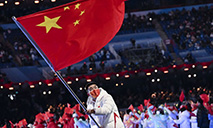From bourses to dinner tables, Ukraine crisis affecting prices in Europe
LONDON, March 1 (Xinhua) -- A flare-up of the Ukraine crisis jolted global markets last week, and uncertainty lingered about its development. Though it seemed far away from many people's daily lives, the economic fallout was expected to ripple and be felt by global investors and consumers sooner or later.
Many held that Europe would take the brunt of the spillover for its proximity to the crisis and its reliance on Russian energy. A knock-on effect was visible. At first, stocks tumbled as investors struck a cautious note, prompting a sell-off of risky assets. At the end, the cost of living for everyone would jump. Whatever comes next, analysts said the uptrend of prices is unlikely to stop any time soon.
RISK-OFF MODE CONTINUES
Amid uncertainty set off by the crisis, risk aversion ran higher, striking at the heart of risky assets, such as stocks.
"Unless the situation in Ukraine improves, the global de-risking now underway will probably continue," the London-based consultancy Capital Economics said, noting that another 10 to 20 percent fall of major stock indices from current levels is quite plausible.
Dependency on Russia's natural resources has sent equity markets in the Netherlands, Germany, and Italy to new lows. Over the past month, the German benchmark DAX index, falling by 5.84 percent, fared the worst among major European markets. In contrast, shored up by oil and commodity giants, Britain's FTSE 100, with one-month rise of 0.34 percent, showed some resilience.
For equities, among the worst performers were those with exposure to either Russia or Ukraine.
"There will be pressure on banking stocks, particularly banks in France and Austria as they have the largest exposure to Russian loans," said Susannah Streeter, analyst from the financial services company Hargreaves Lansdown.
Funds, trusts, and ETFs with exposure to Russia also suffered steep losses.
Further selling pressure on tech stocks came as Ukraine supplied 70 percent of the global demand for neon, an essential material used in semiconductor manufacturing, said Jessica Amir, a market strategist from the Danish investment bank Saxo Bank.
Airlines grappled as well, because of the soaring oil prices and a decreasing willingness of tourists to travel.
While volatility rose, investors sought shelter in safe havens like gold. Last week, gold was pushed to its highest level since January 2021. Silver also reached a fresh high.
Due to the stability of the Swiss financial system, the Swiss franc was considered as another safe haven. Matthew Ryan, senior market analyst from the financial services company Ebury, said a key determinant of the franc's behavior in the short term is the security crisis in Europe and a significant escalation could push the value of the Euro against the franc to its lowest level since 2015.
On top of all these factors, money usually flowed into government bond markets, but analysts from Saxo Bank cautioned that bonds were struggling to provide the usual safe haven as the conflict comes with even higher inflation as a product.
PRICE HIKES ACROSS BOARD
Energy prices shot up on fear of a further supply disruption.
Last week, Brent oil, a global benchmark, surged above 100 U.S. dollars a barrel, a level not seen since 2014, with Europe's TTF gas price increasing by more than 30 percent in one day. If the crisis escalates, Capital Economics expected oil trade to be around 120 to 140 dollars per barrel and European gas to rise close to its mid-December high.
Russia accounts for about 40 percent of imports of natural gas to the European Union and about 30 percent of its crude imports, according to Eurostat.
Ukraine is a key transit hub for Russian oil and gas. Though only a small portion of Britain's gas needs were met by Russia, the increased demand for alternative sources would still send the gas price sky-high, said Charles Archer, a freelance writer for the trading provider IG.
The future of energy supply is stuck in limbo. Western sanctions have bypassed Russian oil to date. The Western countries have decided to remove some Russian banks from SWIFT, the payment system used for most international financial transactions. It remained unclear whether energy would be affected, but "early indications are we are still in the no-touching-the-gas phase of sanctions," said Stanley Pignal, Brussels bureau chief for The Economist.
Prices were expected to plateau, if not rally further. "Whatever happens next, one thing is clear: Energy prices are unlikely to come back down in a hurry," said Fawad Razaqzada, an analyst from the broker ThinkMarkets. It had a domino effect. Amir noted that much of European fertilizer production relies on Russian natural gas. One thing led to another, and food prices were likely to climb.
Other factors contributed too. Russia and Ukraine were big food suppliers, especially in grains. Together they accounted for 25 to 30 percent of global wheat exports, and around 80 percent of global sunflower seeds, said Capital Economics.
Following the tensions, the European price of wheat, according to the IG, has hit a 10-year high. While uncertainty in the Black Sea region remained, it would affect the grain exports.
Also, Russia was a key producer of platinum group metals, like palladium, mainly used in catalytic converters, said Shaun Murison, a senior market analyst from IG.
Meanwhile, aluminum and nickel rocketed to new highs last week. Mining giant Rio Tinto has warned that possible U.S. sanctions on Moscow may disrupt the aluminum supply.
COST-OF-LIVING CRISIS
"The surge in the oil price is terrible news for businesses and consumers," said Russ Mould, investment director at AJ Bell, a provider of online investment platforms.
Mould said the Russia-Ukraine conflict will further stoke inflation. "Not only will energy bills keep going up, but food prices look set to jump even higher," he said.
In Britain, the surge in energy prices, if sustained, will boost the consumer price index by an extra 1.5 percentage points, and households' real disposable incomes are set to fall by about 2.2 percent this year, the most since World War II, said Samuel Tombs, chief British economist from the consultancy Pantheon Macroeconomics.
It would aggravate the already worsening cost-of-living crisis facing households. Simon Williams, fuel spokesman for British automotive services company RAC, said if the oil price reaches 110 dollars, it would cause "untold financial difficulties for many people who depend on their cars for getting to work and running their lives" as it would make the cost of a full tank of gas skyrocket.
Food costs would creep up as well. "Past experience tells us that disruption to Ukraine's exports will have an impact on global food supplies and on the price of a range of key commodities, such as vegetable oils and maize, which are important in UK food production," said Karen Betts, chief executive at Britain's Food and Drink Federation.
Then there is the gas crunch. "The true cost to the European bloc in the event of a disruption to Russian gas supplies would be felt by consumers across the continent as removing a key strategic and sizable portion of the gas supply will drive the global demand and price of gas up, irrespective of its origin," said a report released by the Italian think tank Institute for International Political Studies.
Optimism remained that the economic shock would not last well into this year. Analysts from British financial services firm Smith &Williamson found that historically, the market's response to geopolitical events tends to be short-lived and that, on average, losses resulting from geopolitical events are erased within one month.
"Whereas elevated uncertainty is rattling markets, a genuine financial crisis in which money or credit markets seize up remains very unlikely," said Holger Schmieding, chief economist at the German investment bank Berenberg.
Photos
Related Stories
Copyright © 2022 People's Daily Online. All Rights Reserved.










